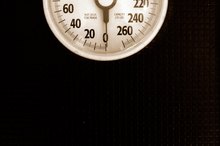Whey Protein for Endomorphs
Whey protein is a nutritional supplement that originates from cow’s milk 1. Available as a powder or premixed shake, whey protein can complement your other food proteins or replace them, depending on your fitness goals. As an endomorph with a tendency to gain weight easily, you can include whey protein to your diet with the understanding that it has advantages as well as disadvantages for your body type. Seek the counsel of a dietitian before adding whey protein or any supplement to your fitness plan.
Body Type
Your somatotype, or body type, describes the natural shape of your body, your tendency to gain weight and the type of weight you gain. Ectomorphs are naturally slender, often with little body fat, long bones and lean muscles. Mesomorphs are muscular, with a tendency to pack on lean body mass easily and a body shape that is well balanced. Endomorphs, on the other hand, are prone to adding fat to their frames with little effort. Often pear-shaped, endomorphs carry the bulk of their body fat from the waist down and tend to have less lean body mass and more total body fat than ectomorphs or mesomorphs.
- Your somatotype, or body type, describes the natural shape of your body, your tendency to gain weight and the type of weight you gain.
- Mesomorphs are muscular, with a tendency to pack on lean body mass easily and a body shape that is well balanced.
Whey Protein
How to Tell If Your Legs Are Mostly Muscle or Fat
Learn More
Whey proteins are nutritionally complete, meaning they provide your diet with all the protein building blocks, or amino acids, you require in your daily meal plan. Whey proteins are easily absorbed by your digestive system, and, additionally, they contain a high proportion of branched-chain amino acids. These amino acids have the ability to become directly absorbed by your muscle tissue without first undergoing metabolism by your liver. This feature of whey protein may impact how much of it you choose to include in your endomorph diet.
- Whey proteins are nutritionally complete, meaning they provide your diet with all the protein building blocks, or amino acids, you require in your daily meal plan.
- Whey proteins are easily absorbed by your digestive system, and, additionally, they contain a high proportion of branched-chain amino acids.
Benefits
Whey proteins not only add high-quality protein to your nutrition but also add it in a low-fat package. These supplements are convenient for traveling, whether to the office, to school or on the road, and require little or no preparation. As an endomorph, you may be carefully tracking your nutrient intake to avoid unwanted weight gain, and the predetermined serving size and protein content of whey supplements allow you to easily monitor your daily protein intake. Furthermore, whey supplements are available in several flavors to add variety to your diet, a fact you may especially appreciate when restricting calories.
- Whey proteins not only add high-quality protein to your nutrition but also add it in a low-fat package.
- Furthermore, whey supplements are available in several flavors to add variety to your diet, a fact you may especially appreciate when restricting calories.
Drawbacks
What Body Type Am I if I Gain & Lose Weight Easily?
Learn More
Because whey protein is so readily absorbed and utilized by your body, overconsumption can easily add unwanted pounds to your frame. Over time, if the calories you consume outnumber the calories you burn, the excess will store as fat, no matter what the original food source. Additionally, as an endomorph minimizing calorie intake, you may be at risk for a nutritional deficiency if you substitute whey protein for whole-food proteins that add other essential nutrients to your diet, such as calcium and iron.
Related Articles
References
- Utah Education Network: Protein - Complete and Incomplete
- BeginnerTriathlete.com; The Athlete’s Kitchen by Nancy Clark: Building Muscles
- Hoffman, J. R., & Falvo, M. J. (2004). Proteinâwhich is best?Journal of Sports Science and Medicine, 3(3), 118.
- Luhovyy, B. L., Akhavan, T., & Anderson, G. H. (2007). Whey proteins in the regulation of food intake and satiety. Journal of the American College of Nutrition, 26(6), 704S-712S.
- Frestedt, J. L., Zenk, J. L., Kuskowski, M. A., Ward, L. S., & Bastian, E. D. (2008). A whey-protein supplement increases fat loss and spares lean muscle in obese subjects: a randomized human clinical study. Nutrition & Metabolism, 5(1), 8.
- Baer, D. J., Stote, K. S., Clevidence, B. A., Harris, G. K., Paul, D. R., & Rumpler, W. V. (2006). Whey protein decreases body weight and fat in supplemented overweight and obese adults. The FASEB Journal, 20(4), A427-A427.
Writer Bio
A writer since 1985, Jan Annigan is published in "Plant Physiology," "Proceedings of the National Academy of Sciences," "Journal of Biological Chemistry" and on various websites. She holds a sports medicine and human performance certificate from the University of Washington, as well as a Bachelor of Science in animal sciences from Purdue University.









